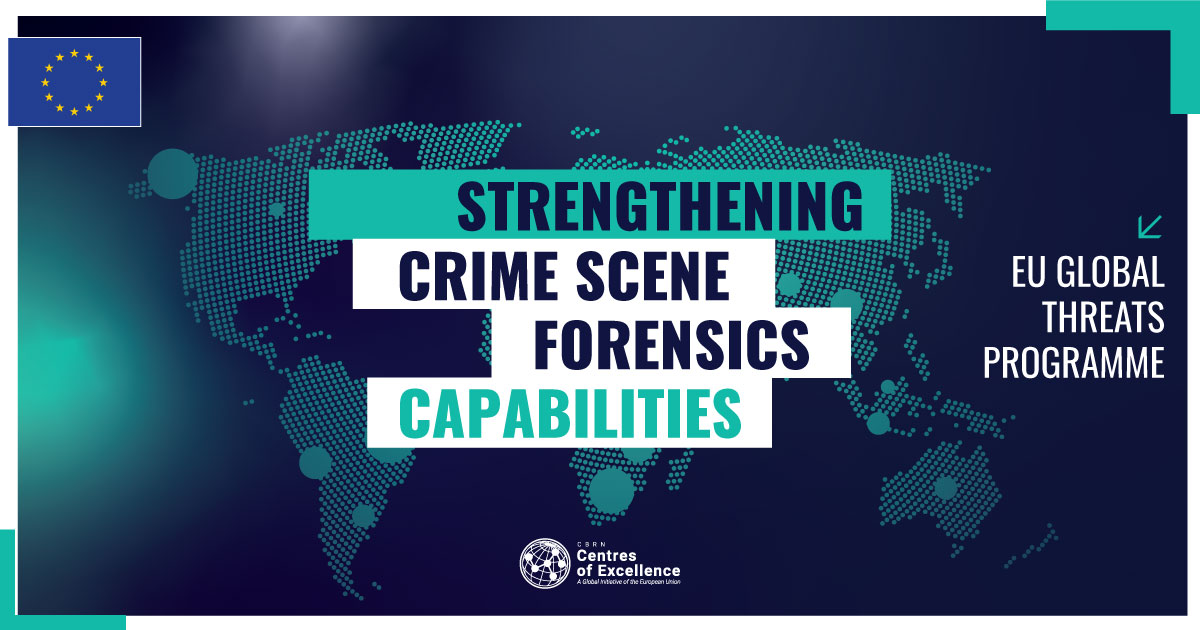
Context
Over the past few years, amidst a deteriorating global security situation and the threat posed by accidental or intentional Chemical, Biological, Radiological and Nuclear (CBRN) events has grown stronger. The development and reinforcement of a state-of-the-art capacity to detect and mitigate CBRN related risks associated with specialised Crime Scene Investigation are, therefore, fundamental for enabling an adequate and effective risk mitigation and incident response. CBRN forensics is a branch of forensic sciences focused on the investigation of incidents, attacks and threats involving hazardous materials.
In an escalating situation of regional geopolitical instability in the Middle East, the occurence of accidents or intentional malicious use involving CBRN agents represents a significant possibility. Building up CBRN forensics capacities and strengthening CBRN forensic skills in Iraq, Jordan and Lebanon are considered a priority and can ensure that forensic personnel and emergency responders who need to deal with CBRN incidents are adequately trained and prepared.
Overall objective
The project aims to develop highly-qualified capacities in the field of CBRN forensics for each partner country based on their needs, considering also a regional approach to foster interoperability. To address the specific global and transregional threats to international security, the project does so by enhancing governance and cooperation on CBRN risk prevention, detection and mitigation.
Specific objectives
- Strengthen existing traditional forensic capabilities in investigating and prosecuting CBRN incidents among relevant stakeholders.
- Develop a training programme on forensic investigations and prosecution in CBRN related cases.
- Improve forensic awareness and procedures for first responders.
- Foster interoperability of institutions, authorities and first responders in CBRN incidents.
- Establish a network of CBRN and forensics-related institutions and experts dealing with CBRN investigations at national and regional level.
Concrete activities
- Presentation of good practices and state-of-the-art technologies regarding detection, Crime Scene Investigation (CSI) procedures and prosecutor’s guidelines related to CBRN crimes and CSI in a CBRN environment.
- Specialised training and equipment needs assessment for CSI and lab personnel.
- Forensic awareness training and Training-of-Trainers programme for first responders.
- Delivery of national training for CSI specialists and laboratory personnel including medical personnel.
- Training for prosecutors and judges to increase the CBRN-related prosecutorial capacity.
- National field exercises to improve interagency cooperation.
- Study visits and establishment of an informal regional network of forensics experts and forensics institutions.
Expected results
- Trained forensics teams within forensic institutions and specialised CBRN teams able to carry out crime scene investigations in a CBRN setting have been established.
- Standard Operating Procedures for CBRN-related investigations tailored to each country have been created.
- Prosecutors and judges have been trained to improve the prosecutorial capacity of CBRN-related crimes.
- Awareness of first responders to preserve the CBRN crime scene acting in a CBRN environment is enhanced.
- Cross-border and interagency capacities and cooperation for CBRN-related investigations have been improved.
- Network in the region for CSI and CBRN experts has been established.
Achievements
The project has concluded the inception phase resulting in a better understanding and update of the status of capabilities, available resources and needs for CBRN forensics in the partner countries. The implementation strategy has been developed.
- Project duration
- 11 Jan 2024 - 11 Jan 2027
- Project locations
- IraqJordanLebanon
- Overall budget
- €1 968 000
- Threat area
- CBRN Risk Mitigation
